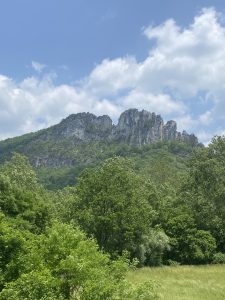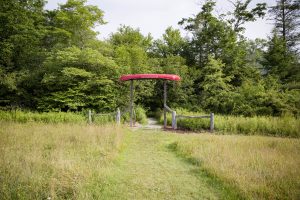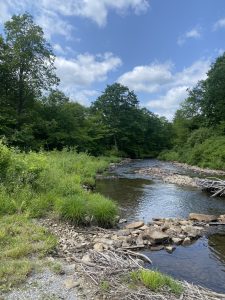Caitlin Douglas: Positive Environmental Feedback
Positive Environmental Feedback: How Helping the Environment Helps Everyone
My name is Caitlin Douglas. For my Photovoice project, I interviewed Bekah–a 25-year old female Florida native with a degree in natural resources. Bekah works at a nature school during the school year and a summer camp in West Virginia over the summer. When I asked her if she would be willing to participate in this project, she was really excited to talk about environmentalism as this is an important topic to her. As someone who spends the majority of her workday outside, she has a special relationship with the natural world around her. She freely consented to the use of her pictures and stories here.

“A large portion of my view of health is about being outside- I spend my summers in West Virginia working at a summer camp doing a variety of things. The first photo is of a state park- the peak of environmentalism- clean, pristine, and well taken care of. This photo and these places show how our environments relate to your health but being well cared for and making a public space feel safe, clean, and overall worth spending time in. I find state/national parks to be the prime example of environmental health by encouraging people to be healthy outside while also viewing a clean and healthy environment.”
Analysis: In this description, Bekah describes state parks as “peak environmentalism- clean, pristine, and well taken care of.” This gives us insight into what Bekah’s viewpoint on environmentalism is–she believes in preserving nature as much as possible, and believes it is best when it is undisturbed. She emphasizes the importance of taking care of these public spaces as it can positively affect community health. By having clean, natural places open to the community, you are promoting both physical and mental health. In order to have these places remain open to the community, though, they have to be maintained, and Bekah believes a lot of this maintenance should fall upon the community itself–we should preserve the places that matter to us. This gives us insight into Bekah’s personal beliefs–she values accountability and group-action… in short, she believes everyone should chip in and do their part.

“This second picture is the entrance to the summer camp I work at. Walking under this canoe into camp is a trail to a happy and healthy summer! Spending time outdoors, making new friends and being in a physical and emotionally healthy environment. This to me feels important because it bridges the gap between just environmental and physical health and adds in emotional well-being which can be greatly improved by being outdoors. Spending even 30 minutes outside per day is showed to increase your endorphins and make you feel happier and healthier!”
Analysis: With this second picture, Bekah makes her own claims about the benefits of preserving the environment–physical health. She cites that “30 minutes outside per day is showed to increase your endorphins.” As someone who spends far more than 30 minutes outside per day given her career choices, we can gather that Bekah takes this statistic to heart. Being outside is virtually free, making the environment an important part of community health as a whole. If environmental spaces (even the grass outside your work!) are well-maintained and clean, it can be utilized to promote community health and wellness. Bekah’s commitment to the environment shows a community-minded approach by trying to preserve an important health resource that everyone has access to.

“My first 2 photos help lead into this last picture of my “happy place”, somewhere I feel emotionally at peace. Finding emotional comfort is a huge aspect of our current health crisis and being able to find it outside makes it even more special. This photo is my favorite of the 3 because it shows the progress from overall health and environmentalism trickling down to internal health and environmentalism. By keeping my body and mind healthy I can give back to my space.”
Analysis: In this reflection, Bekah mentions the health crisis and the importance of finding emotional comfort. She views health as existing upon two spectrums (physical and mental), and has shown us how being outside can positively affect both of those aspects of health. The most importance part of her reflection is at the end, though, where she mentions that by preserving her own peace, she is able to give back to the community. This creates a cycle of health. By being outside, you help both your physical and mental health. By having improved physical and mental health, you have more space to help the environment and your community, which continues the spread of good health. Bekah is a community-minded individual who believes the greatest thing you can do is continue to give back, as it will create a positive cycle that will have lasting impacts on both the community and the environment.
Theme: The first theme for this Photovoice is community. Community is at the core of Bekah’s belief-system. In her perspective, community is a constantly moving system of give-and-take. If everyone is contributing to community wellness, everyone stands to benefit from it. Which leads us to our second theme–environmental preservation. One of Bekah’s core beliefs is environmental preservation. By preserving the environment, you are feeding the things that feeds you, and creating a positive feedback loop with your community. The environment ties the community and community health together.
Course Connection: In our first module, we learned the benefits of focusing on the environment around us. By watching videos of nature walks, doing some of our own, or listening to the sounds of rain or fungi, we learned the importance of pausing to pay attention to our environment. Bekah does this every day, and this feeds into her physical and mental health. This is shown by our health and environmental vulnerabilities section of our first module. This article highlights correlations between the environment and our health, including access to clean air and water, or even social services. Bekah’s belief is that by taking care of our own mental and physical needs, we are better able to give back to the community to help others–in this case, by preserving the environment to give everyone the same chance to enjoy it.
Media Attributions
- IMG_8970
- IMG_8830
- IMG_8844

